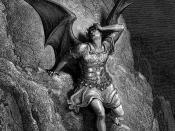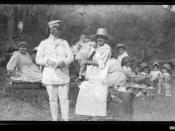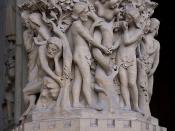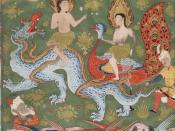June 3, 1998 world Literature The Root of All Evil The early modern period contains many characteristics that involve the process of branching out into new forms and ideas. These new ideas are based on everything from personal issues to government issues. They are also from individual downfalls and downfalls of their society. Throughout this style of literature there is an emphasis on reader involvement and a change on how religious characters are portrayed. This change places the characters of the text into perspective for both the reader and the writer. In Milton's Paradise Lost he uses these characteristics. He does not put the main emphasis of his text on God, like most early literature of the time period. He draws the reader's attention towards Satan and towards evil, almost discrediting everything that is good. This is a new twist for literature. Milton uses evil to attract the reader's attention.
While at the same time involving the emotions of the reader. This develops a totally new perspective of religion, and develops a different perspective on such a prominent subject and characterizes the period.
Satan is shown extremely early in the text and is an fact a lead character throughout. After Milton quickly discusses man's disobedience to God and the loss of Eden, he immediately focuses the readers attention to Satan. This is a different angle than that of earlier literature, because this text allows the reader to understand the sins of the character. At this point Satan contains some qualities of Heaven but they are perverted. This perversion is evil and Milton believes this evil is attractive. This attraction diverts the readers attention to this character and involves the readers emotions toward the character.
Milton also uses this attention technique when Satan is talking to himself. Here he recalls his glorious life in Heaven and how distinguished his position was at that time. He admiringly states that God created him and how easy it was to serve and praise him. Also, as if crying for sympathy, he states how there is no escape from Hell. During this Milton almost forces the reader to feel pity for the Satan, while disregarding the beautiful scenery at the garden of Eden. This focus on evil displays the twists this type of literature exhibits. Milton wants the reader to realize the diverse tangents of evil instead of primarily focusing on the good. By focusing on the good repeats the new perspective characteristics that the period illustrates.
The way in which Milton characterizes Adam and Eve is very different than that of Satan. He bluntly states their vulnerability but almost implies their stupidity. Satan whispers evil dreams in Eve's ear. He suggests to her imagination that she should commit an act of evil, which in this case is to eat the fruit from the tree of knowledge. In the process he produces excessive wants and desires in her mind. This makes her wake up uneasy and startled. At this point she nor Adam know of the evil that is trying to trap them, not until they speak with Rafael. Raphael's visit, having several purposes, serves as a warning to the two of the threat of Satan. They both knowingly understand good and evil for which they know they were forbidden. Adam was severely warned not to trust in Eve's beauty, for it is only worth his love, not his subjection. If Adam had remained true to Raphaels's words then he would not have accompanied Eve in eating from the tree. Likewise for Eve, if she had kept her faith in God, and not believed the serpent, she would not have eaten from the tree. Milton distinctly points out these flaws during the last quarter of his epic therefore putting a twist on how these two characters are primarily viewed. He also continually discredits the characters by making them seem ignorant. He does not use this technique on Satan, and this makes evil more appealing. Furthermore, Milton develops a new perspective on religion by placing Satan as the more attractive character. Throughout these books, Milton is at the same time influencing the reader to become involved in Adam and Eve's situation and understand their emotions.





